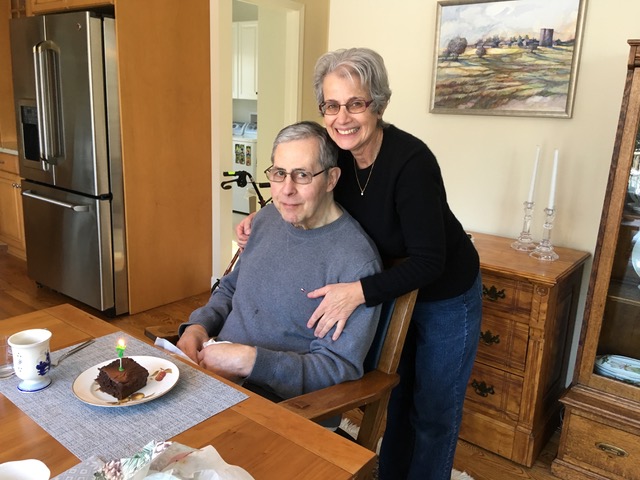
10 minute read
My husband, Fred Dowaliby, died of Parkinson’s Disease Dementia on Oct. 19, 2019 at the age of 77. Since his death, I have reflected on his journey of nearly a decade.
Fred was an accomplished, talented man with a PhD. in educational psychology. As a researcher and statistician, he was known for his research and enduring interest in Locus of Control, along with research in Deaf Education on motivation, student attrition, reading and multimedia instruction. Fred was a builder of hot rods, an excellent billiard player, a life-long weightlifter, a karate and yoga enthusiast, an army veteran and paratrooper, a gardener, husband, father, and grandfather.
We began to see disturbing changes in Fred’s physical abilities a couple of years before his 70th birthday; even though he was still exercising like a madman, lifting weights and practicing karate 5 days a week. Fred complained to his cardiologist of a lack of stamina. His legs felt weak and rubbery; he was walking slower, shuffling and stumbling; had difficulty climbing stairs. We thought his problems were circulatory issues. After receiving a pacemaker for having a low heart rate, Fred continued to have those motor symptoms along with low blood pressure episodes. Finally, his cardiologist said , “Fred, it’s not your heart. I think you should see a neurologist”.
Fred met his first neurologist in March of 2014. At that meeting Fred presented these symptoms: stooped posture, forward bending of head and neck, flat facial expression, small, slow, shuffling steps, tripping, difficulty rising from a chair and climbing stairs, and orthostatic hypotension. Based on those symptoms, the neurologist diagnosed Fred with multiple systems atrophy (MSA). The neurologist told us that there was no cure for MSA and that it was terminal.
Finally, his cardiologist said , “Fred, it’s not your heart. I think you should see a neurologist”.
Devastated, we read articles on MSA and questioned the diagnosis. We wondered: given the small number of Fred’s symptoms that correlated with MSA, how many are necessary for a reliable diagnosis?
We sought a second opinion. Neurologist #2 concurred with the diagnosis of MSA. Fred asked: Are there treatments, which slow the progress of the disease? “No.” Would I benefit from a trial of one of the Parkinson drugs? “No, carbidopa/levodopa doesn’t help people with MSA.” In terms of the progress of the disease, what can I expect? “Expect things will get worse.”
When Fred asked how could he participate in clinical trials, we were referred to a movement disorder clinic. Unfortunately, as a result of staff turnover, Fred had five neurologists in the next 5 years. At each meeting with a new neurologist, we outlined Fred’s symptoms and history. Fred asked: “Given the inferential nature of the diagnosis, in the absence of clinical evidence, how can I be sure that my disease is MSA?” (These are Fred’s words and demonstrate the cognitive reserve he still had at that time). Even so, Neurologists 3 & 4 continued to believe Fred had MSA.

As time passed, Fred’s symptoms increased and worsened. His voice got softer, hoarser; handwriting got tinier, he had more difficulty walking, turning, and freezing as he tried to walk. His balance deteriorated, he fell many times and began to use a walker. He could no longer drive. He had difficulty with fine motor skills like typing or using the remote. He had trouble with some cognitive processing tasks. He began to have mild hallucinations.
Our continued questioning of the diagnosis, left us stressed. We felt like we were swimming in a pool of Jello trying to get answers.
It was Fred’s 5th neurologist who himself questioned the diagnosis of MSA. After reviewing Fred’s symptoms, neurologist #5 said, “It can’t be MSA, because people with MSA usually stay cogent until the end of life. And, Parkinson’s Disease patients also can have low blood pressure.” At last we had a diagnosis: of Parkinson’s Disease Dementia.
After the PDD diagnosis, we attended Parkinson’s conferences and lectures. In addition to his weightlifting, Fred joined PD boxing, PD exercise classes, participated in the Parkinson’s Voice Project. At a PD conference, we learned that if one can improve cognition one can improve movement. Until then, Fred wasn’t treated for either cognition or movement. I wish Fred had been diagnosed with PDD earlier; he might have been treated sooner for both movement and cognitive issues and he would have engaged sooner with PD exercise classes and conferences.
Fred needed a neurologist who could have been a partner in his care. That didn’t happen; couldn’t happen with 7 different neurologists in 6 years. Fred’s was a difficult journey and no one stayed with him through that journey. No one got to know Fred’s values or what brings him meaning in life. We needed a consistent “guide by our side” who could have given us some anticipatory guidance for what was ahead in terms of the disease progress. We were hungry for information and understanding of the disease, prognosis, and trajectory. Fred asked each neurologist what to expect; how long might he live, where was he on the trajectory, how would he die? The answers were vague – “everyone is different; you could get worse and then plateau, there’s no crystal ball, etc.”.
I wish Fred had been diagnosed with PDD earlier; he might have been treated sooner for both movement and cognitive issues and he would have engaged sooner with PD exercise classes and conferences.
In addition to his neurologist, Fred was treated by an array of specialists: cardiologist, urologist, dermatologist, pulmonologist, otolaryngologist for paradoxical vocal fold movement disorder, and gastroenterologist. In the year before he died, Fred developed severe diarrhea and after many months of testing was diagnosed with ulcerative colitis. We found that some doctors had unrealistic expectations of Fred to manage such things as catheters, diarrhea from colitis, or prepping for a colonoscopy; that the spouse has to do these things. Similarly, a specialist might not understand how a procedure or medicine might affect Fred’s PDD or alternatively might blame a particular symptom on PDD. For example, a urologist after Fred’s 2nd TURP surgery, attributed Fred’s urine retention to his PDD although in fact it was a side effect of mididrine. Who advises the specialist that if the patient needs surgery, that anesthesia could worsen cognition? Who alerts the caregiver and patient that a hospital stay may bring on hospital delirium? I wish Fred had been treated in a multidisciplinary approach so that the neurologist could help other specialists understand the Parkinson’s Disease patient.
Over time, I became Fred’s one-to-one aide. I had to lift Fred from bed, help him move from chair to chair, help him onto the toilet, help him shower, clean him, dress him, put his various creams on him, manage the catheter, help manage his diarrhea and wake up with Fred 4-5 times a night. I was his protector, his interface with medical professionals, his researcher, his driver. I gave up my classes, my committees, my friends.
Twelve months before Fred died, in a session with Fred’s counselor, I broke down. Sobbing, I told the counselor that I felt like a broken woman. I felt no sense of self. I didn’t think I could go on one more day. The counselor then referred us to Palliative Care. We were skeptical. How could another specialist help us?
But Palliative Care did help us! I wish Fred had been referred to Palliative Care earlier in his journey, maybe as soon as we learned of the terminal nature of his illness. In our first meeting, the Palliative Care doctor asked if Fred had his MOLST form done. No, Fred said, it’s been on my desk for a year. The doctor proceeded to walk through the MOLST topics, helping Fred understand the import of each one and possible scenarios. We learned from that doctor the consequences of a health crisis, surgery, or illness. That each one would knock him back, so to speak. “You won’t come out of it at same level as you entered the crisis.” Knowing that earlier, would have helped us understand why his PDD symptoms worsened after his prostate surgery and after hospitalization for ulcerative colitis. At one meeting, Fred wept and told the palliative care doctor that he didn’t want to live like this. He felt free to ask, “What were his options?”
But Palliative Care did help us! I wish Fred had been referred to Palliative Care earlier in his journey, maybe as soon as we learned of the terminal nature of his illness.
Lastly, I wish we had been alerted to the possibility of his death in the near future. In July of 2019, had we any idea that Fred would die three months later, we might have made different decisions about his care and our life. We would not have chosen a nursing home. We thought it would help us both live better for another year or two. We didn’t know his time was short. We didn’t know about transfer trauma and the possible negative effects of transferring to a nursing home. I wish we had known things like transfer trauma and terminal delirium before they happened, not after. Within a week of being at the nursing home, Fred’s symptoms got much worse; he quickly deteriorated and lived at the nursing home only six weeks before being hospitalized for stroke – like symptoms. He was unresponsive, not eating or drinking. A few days later he had what appeared to be a seizure. I was told he needed a feeding tube. But, I would not override his MOLST form. After a week in the stroke unit, I asked for help from Palliative Care. Fred was moved to the Palliative Care Unit; he was not abandoned; he received excellent, compassionate care; and was able to remain there until he died.

Fred died of Parkinson’s, not with Parkinson’s. He didn’t have pneumonia, cancer, heart disease, lung disease, or diabetes. PDD gradually robbed him of his abilities, avocations and his enjoyment of life. I believe his journey with PDD didn’t have to be so hard.
I have come to believe that the union of neurology and palliative care is critically important. Why? Because unlike someone dying from a painful disease like cancer, managing pain was not Fred’s greatest need; rather managing the turmoil in his mind, the confusion he felt, and the lack of personal control and understanding of that last phase of living.
It is with the hope that many others will benefit from Neuropalliative care, that in the memory of this vibrant man who was my husband, we created the URMC Dr. Fred J. Dowaliby Lectureship in Neuropalliative Care.
Note: I acknowledge with gratitude the guidance and encouragement of Dr. Robert Holloway, MD, MPH, URMC, in developing this essay.

Oh, my Bernadette! As sad as it may seem, I must say that you and Fred were born to travel this journey together and with others! This is a remarkable account of Fred’s story, and only you could have told it so well.
Surely, we will all benefit in Fred’s memory from URMC and the understanding of Neuropalliative Care. May we be guided to the appropriate medical and support staff so that we can live lives of greater meaning and bless mankind with our shared suffering and deep love and commitment as you and Fred did.
Thank you for your sharing and for your effort spent in telling Fred’s journey in the written word. It will live on as does our love for Fred, an admirable man of great courage.
My grandma has Parkinson’s disease, she is about 75 years old it was detected 7 years ago. Right now it’s getting more difficult to live for her, because of stiff muscles she can’t even move. L-dopa and carbidopa medicines are given, but won”t give much relief. She can”t eat food and the skin is damaging forming ganglia. I thought this might be the last stage and the medications she was given did not help at all, so I started to do alot of research on natural treatments, I was introduced to Health Natural CentreU.S and their Parkinson’s Herbal Protocol. She started on the Parkinson’s Treatment last year, her symptoms gradually diminished including her Tremors, Body Weakness and Muscle Pains. She is getting active again since starting this treatment, she is able to walk again ( down the street and back ) and able to ride her treadmill again! God Bless all PD Caregivers. Stay Strong, take small moments throughout the day to thank yourself, to love your self, and pray to whatever faith, star, spiritual force you believe in and ask for strength. I can personally vouch for these remedy but you would probably need to decide what works best for you.